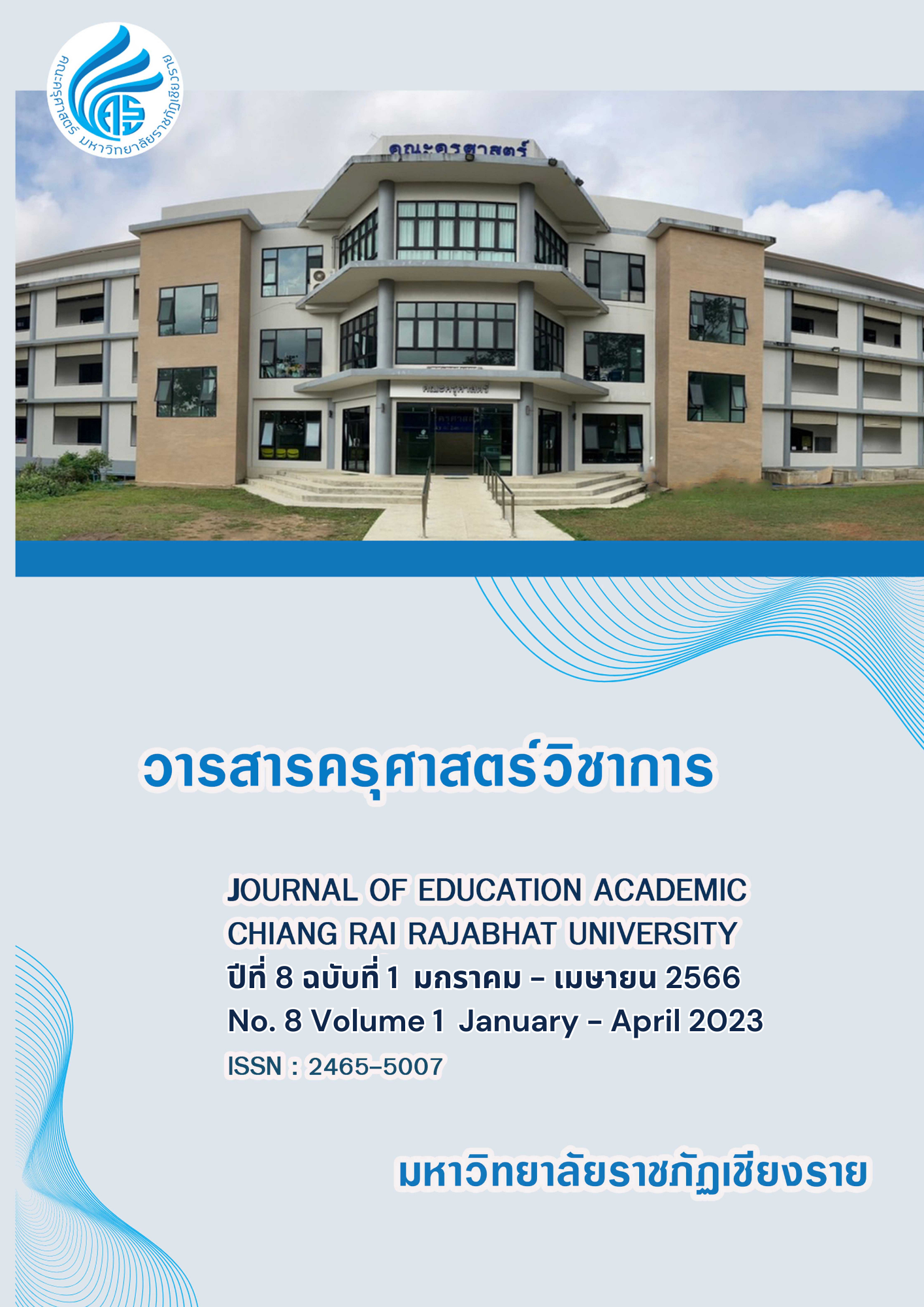Development of School Curriculum Administration and Management Strategies in Digital Era for Fang Dhammasuksa School
Keywords:
Strategy, Administration and Management, Curriculum, Digital AgeAbstract
This mixed-method study aimed to develop school curriculum administration and management strategies in digital era for Fang Dhamasuksa School. The study was sectioned into 4 stages. Stage 1 Surveying school curriculum administration and management problems: (1) Quality of learners was examined by documentary analysis. The research instruments were learning achievement evaluation form following school curriculum and Self Assessment Report (SAR), and content analysis was used for data anlaysis and summarized in narrative format. 2) School curriclum administration and learner-centeredness education was examined by quantiative approach by using questionnaire to collect the data from 20 participants including school director, 4-division school administrators, teachers, parents, school committees and students. The questionnaire data was calculated for mean and standard deviation. Stage 2 Examining factors affecting quality of school curriculum administration and management, and Stage 3 Designing desired future scenerio of school curriculum administration and management were delivered by involvement of 20 participants including school administrators, teachers, parents, students and school committees. Stage 4 Developing school curriculum adminstration and management strategies recruited 10 participants for data collection that included school director, 4-division of school administrators, teachers, parents, and school committees by means of participatory action research (PAR). The research instrument was AIC workshop. The data was analyzed by content analysis and summarized into narrative format in order to synthesize and construct the guidelines for strategic administration. The results showed that:
- School curriculum administration and managment circumstance regarding quality of learners: The The survey of students’ learning achievement from all learning areas, in overall, revealed the quality at the high level. The school curriculum administration and management process, in overall, was rated at the high level. The learner-centeredness education process, in overall, was also rated at the high level.
- The factors affecting the strategies for school curriculum administration and managment concerned 2 aspects i.e. internal and external factors. Quality of learners dealt with external factors which were budget support, parents, community, community learning resources, supports from other organizations. The de-promoting factors were monk teachers, inadequate equipment, lacking disciplines and innovation, unclear development process. Curriculum administration and management dealt with promoting factor which was community while the de-promoting factor was budget support. The promoting internal factors were clear development plan, participatory monitoring and evaluation, promoting staff for self-development, school curriculum administration corresponding to the local context. The de-promoting factors were budget support, obsolete equipment, lacking consistent research, supervision and monitoring, excessive focus on monk teachers, teachers lacking the use of technology. The learner-centeredness education dealt with promoting external factors which were budget support, parents, community and other organizations. The de-promoting factor was budget support. The promoting internal factors were learning and real practice, equipped with media and technology, environment favorable for learning, allowing opportunity for all ethnic groups. The de-promoting factors were teachers overloaded with extra-works, lacking research, lacking monitoring and evaluation consistently, students’ weaknesses on technology.
- Desired future scenario for school curriculum administration and management regarding learners were learners showing learning achievement at school and national test level. The curriculum administration and management dealt with stakeholders shared curriculum implementation together and learning process utilized learner-centeredness approach.
- Strategies for school curriculum administration and management were proposed. Strategy 1 Learner showing quality underlying education standards. Strategy 2 Educational administration implementing PLC. Strategy 3 Teachers and educational personnel showing potentials following professional standards. Strategy 4 School serving as learning resources on local handicraft.
References
กนกนารถ ศรีกุลนะ. (2559). แนวทางการบริหารศูนย์พัฒนาเด็กเล็กตามมาตรฐานการดำเนินงานของศูนย์พัฒนาเด็กเล็กบ้านศรีดอนมูล ตำบลศรีดอนมูล อำเภอเชียงแสน จังหวัดเชียงราย. (วิทยานิพนธ์ครุศาสตรมหาบัณฑิต). มหาวิทยาลัยราชภัฏเชียงราย. เชียงราย.
ชัยยุทธ ศิริสุทธิ์ (2564). กลยุทธ์การบริหารงานวิชาการในยุคดิจิทัลของสถานศึกษา สังกัดสำนักงานคณะกรรมการการอาชีวศึกษา. (วิทยานิพนธ์ครุศาสตรมหาบัณฑิต). มหาวิทยาลัยราชภัฏเชียงราย. เชียงราย.
พระสุพิทักษ์ โตเพ็ง. (2561). รูปแบบการพัฒนาโรงเรียนพระปริยัติธรรม สู่ความเป็นเลิศ. มหาวิทยาลัยราชภัฎสวนสุนันทา.
วิโรจน์ ศรีเหรัญ. (2558). แนวคิดและทฤษฎี Edward Damming. สืบค้นเมื่อ 5 มกราคม 2563. จาก. http://wirotsriherun1.blogspot.com/2015/08/11-edward-damming.html.
โรงเรียนฝางธรรมศึกษา. (2563). รายงานการประเมินตนเอง (SAR). แผนพัฒนาตนเอง ของโรงเรียนฝางธรรมศึกษา. อำเภอฝาง จังหวัดเชียงใหม่.
ศุภวิชญ์ ไชยมงคล. (2562 ). การพัฒนายุทธศาสตร์การบริหารและการจัดการหลักสูตรกลุ่มสาระการเรียนรู้ภาษาไทย ระดับชั้นมัธยมศึกษาตอนต้น ที่สอดคล้องกับการศึกษาไทย 4.0. โรงเรียนผ่านศึกสงเคราะห์ 2.
สุชีรา มะหิเมือง. (2559). รายงานการวิจัย แนวโน้มภาพอนาคตการศึกษาและการเรียนรู้ของไทยในปี พ.ศ. 2573. แหล่งข้อมูล http://www.thaiedresearch.org/index.php/home
Henry Fayol. (2018). บิดาทฤษฎีการบริหารจัดการ. สืบค้นเมื่อ 3 สิงหาคม 2020. จาก http://katika-mek.blogspot.com/2018/01/henry-fayol.html
Downloads
Published
Issue
Section
License
Copyright (c) 2022 Journal of Education Academic Chiang Rai Rajabhat University

This work is licensed under a Creative Commons Attribution-NonCommercial-NoDerivatives 4.0 International License.






